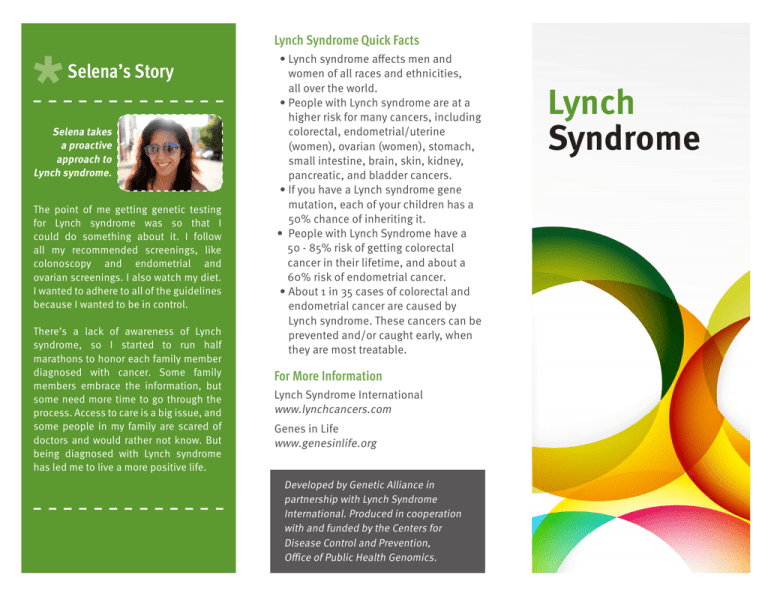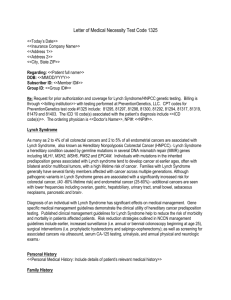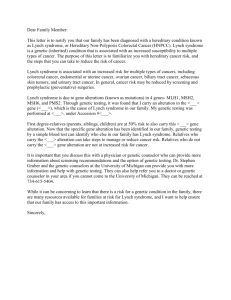* Lynch Selena’s Story
advertisement

* Lynch Syndrome Quick Facts Selena’s Story Selena takes a proactive approach to Lynch syndrome. The point of me getting genetic testing for Lynch syndrome was so that I could do something about it. I follow all my recommended screenings, like colonoscopy and endometrial and ovarian screenings. I also watch my diet. I wanted to adhere to all of the guidelines because I wanted to be in control. There’s a lack of awareness of Lynch syndrome, so I started to run half marathons to honor each family member diagnosed with cancer. Some family members embrace the information, but some need more time to go through the process. Access to care is a big issue, and some people in my family are scared of doctors and would rather not know. But being diagnosed with Lynch syndrome has led me to live a more positive life. • Lynch syndrome affects men and women of all races and ethnicities, all over the world. • People with Lynch syndrome are at a higher risk for many cancers, including colorectal, endometrial/uterine (women), ovarian (women), stomach, small intestine, brain, skin, kidney, pancreatic, and bladder cancers. • If you have a Lynch syndrome gene mutation, each of your children has a 50% chance of inheriting it. • People with Lynch Syndrome have a 50 - 85% risk of getting colorectal cancer in their lifetime, and about a 60% risk of endometrial cancer. • About 1 in 35 cases of colorectal and endometrial cancer are caused by Lynch syndrome. These cancers can be prevented and/or caught early, when they are most treatable. For More Information Lynch Syndrome International www.lynchcancers.com Genes in Life www.genesinlife.org Developed by Genetic Alliance in partnership with Lynch Syndrome International. Produced in cooperation with and funded by the Centers for Disease Control and Prevention, Office of Public Health Genomics. Lynch Syndrome Am I at Risk for Lynch Syndrome? About 10 percent of all cancer cases are hereditary. This means cancer runs in the family, and you can inherit a higher risk for getting cancer. Lynch syndrome is the most common hereditary cause of colorectal and endometrial cancer. In families with Lynch syndrome, people have an increased risk of getting these and several other cancers. People with Lynch syndrome tend to be diagnosed at an earlier age than the general population and often the cancer grows at a fast rate. In most families with Lynch syndrome, several people will have cancer. How Is Lynch Syndrome Inherited? Lynch syndrome is inherited in an autosomal dominant way. Autosomal means that the Lynch syndrome gene mutation is not on a sex chromosome, so both men and women can inherit it. Dominant means that it takes only one Lynch syndrome gene mutation to increase the chance of getting cancer. If one of your parents has a Lynch syndrome mutation, there is a 50/50 chance that you inherited it along with the higher risk for getting certain cancers. If you did not inherit the mutation from your parent, your risk for getting cancer is the same as the general population. DID YOU KNOW ? Everyone has many gene changes (mutations). Sometimes these changes have no effect or are even slightly helpful. But sometimes, like with Lynch syndrome, they can affect your health. There are several genes involved in Lynch syndrome. A mutation in any of these genes means your cells are not able to fix DNA properly. Mistakes in DNA affect healthy cell growth and can eventually cause cancer. Tell me more about my genes • You have two copies of each gene, one from your mother and one from your father. • Genes carry instructions that tell your cells how to work and grow. • A change in a gene is called a mutation. • Genes are inside cells. Every part of your body is made up of billions of cells working together. • Genes are arranged in structures called chromosomes. Most people have 23 pairs of chromosomes. Copies of the chromosomes are found in each cell. • Chromosomes are made up of DNA. DNA is the special code that spells out the instructions in your genes. • Genetic counselors can tell you more about your genes and help you make decisions about genetic testing. Diagnosis Many doctors and hospitals are starting to do universal screening for Lynch syndrome: they will test every colorectal cancer tumor for signs of Lynch syndrome. If a mutation is found in tumor screening, the doctor will recommend genetic testing. A strong family health history of cancer is another reason to get genetic testing. Genetic testing is the best way to diagnose Lynch syndrome. Why Is It Important to Let My Family Know I Have Lynch Syndrome? If you or someone in your family has Lynch syndrome, other family members, adults or children, may also have Lynch syndrome and not know it. Sharing your health information will help you: • Make informed decisions about your health and healthcare. • Get yourself and your immediate family genetically tested for Lynch syndrome. • Get regular screenings to detect and prevent cancer. • Think about risk-reducing surgeries to remove your colon, uterus, and/or ovaries. LYNCH SYNDROME

